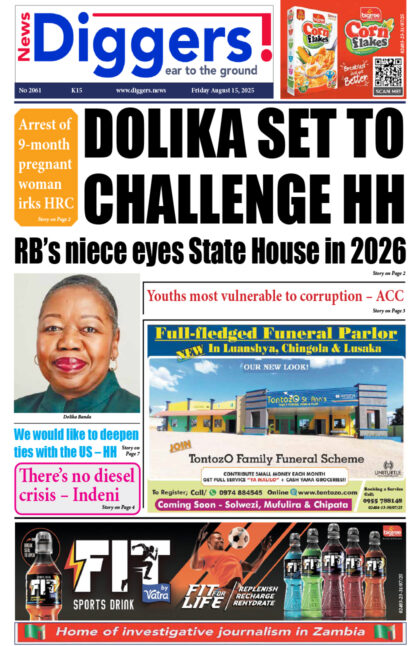MINISTER in the Vice-President’s office Sylvia Chalikosa says those with information incriminating Zambian officials in the Malawi maizegate scandal should take it to law enforcement agencies so that they can act.
Chalikosa was responding to a question for oral answer asked by Choma Central UPND member of parliament Cornelius Mweetwa who wanted to know what role government played in the export of maize to Malawi by the Zambia Cooperative Federation in July, 2016; whether there was any impropriety on the part of the Zambian officials in the management of the agreement; and if so, what measures had been taken against the erring officers.
“Government’s role was just to issue the permit…so when you keep insisting that there were officers involved, that has not come to the attention of any investigative wings so if anyone has issues with any officer, they should relay that information to home affairs who will ably deal with the matter,” Chalikosa, who was representing Vice-President Inonge Wina, said.
When by Monze UPND member of parliament Jack Mwimbu whether her statement that there was no erring Zambian official in the deal meant that the Malawi Commission of Inquiry which probed it was a fraud, she said she could not comment on another country’s state of affairs.
“I can categorically state that Zambia has no jurisdiction to discuss the state of affairs of another sovereign country. And in my statement, I categorically stated that Zambia facilitated in giving a statement. The company Transglobe was given by the Malawian government as the company that would handle the exports,” Chalikosa said.
When Chirundu UPND member of parliament Douglas Siakalima asked Chalikosa whether the maizegate scandal would deter government from assisting other countries in future given the fact that Zambian officials were being accused of corruption, she said government was not aware of such accusations.
“The issue of Malawi finding fault with the transactions of their nationals has got nothing to do with Zambia trying to assist. If the report is implying that there was fraud in Zambia, we are not aware of that fault. That is there internal problem, not a Zambian problem and should Malawi wish to buy maize from Zambia, I don’t think there will be a prohibition of that because it is treated as a commercial transaction,” she said.
In her written answers, Chalikosa explained the circumstances which led to the approval of maize exports to Malawi.
“Although the exports of maize and mealie meal were authorized by government, the players involved are local private sector…these transactions are done purely in commercial terms. The maize is bought from the open market and not directly from the strategic key reserves that are maintained by the Food Reserve Agency,” she said.
“The export of maize to Malawi was sanctioned by our President as a gesture of good neighborliness. The Zambian government allowed ZCF, who entered into an agreement with ADMARC, a Malawian parastatal company to export 100,000 metric tonnes to that country. But before this transaction could be actualized, the government of Malawi requested that the contract amount be split equally between ZCF and the Malawian company called Transglobe. That is 50,000 metric tonnes for ZCF and 50,000 metric tonnes for Transglobe limited.”
She said government did not err in the Malawi Maizegate scandal as it was a commercial transaction.
“The Ministry of Agriculture issued ZCF and Transglobe with the relevant documents that include fumigation certificates, fighter sanitary certificates and export permits. Later, it was discovered by the Zambia Revenue Authority Transglobe limited could not export the maize directly because it was not a Zambian registered company and thus not tax compliant under the Zambian jurisdiction. The said company thus opted to use a Zambian company called ZENAKI Comodoties Limited which was the supplier of the maize that Transglobe bought,” said Chalikosa.
“ZCF exported 4034.36 metric tonnes representing 8.36 percent while ZENAKI Ltd exported 530 metric tonnes representing 1.14 per cent of their respective allocation of 50,000 metric tonnes. There was no impropriety on the part of the Zambian officials the management of the agreement. And no action or measures has been taken against any officers as this was a commercial transaction involving private companies; ZCF, Transglobe and ZENAKI.”























